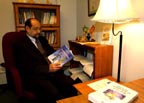February 09, 2005
Unique international collaboration Professor helps train Middle East social workers

Caption follows story
Soliman, a professor in Southern Illinois University Carbondale's School of Social Work, developed a two-year program to upgrade skills of about 320 social workers affiliated with the United Nations Relief & Works Agency for Palestinian Refugees in the Near East. The program's goal is to have better-trained professional social workers providing improved services and intervention strategies to individuals, families, groups, organizations and communities.
Soliman returned Jan. 21 after spending nearly six weeks with another professor teaching two courses to social workers in Amman, Jordan, Damascus, Syria and Beirut, Lebanon. The program, taught in Arabic, consists of eight courses. Social workers in the West Bank and Gaza Strip will participate for the first time next summer.
There are 4.2 million registered refugees in Jordan, Lebanon, Syria, West Bank, and the Gaza Strip.
The international collaboration between SIUC and the United Nations is unique, according to Beth Kuttab, the director of Relief and Social Services Department at the Amman, Jordan headquarters of the UN agency.
"I do not know of any other American university that is offering systematic, custom-designed, on-site training in Arabic to UN local staff who work in five different geographical areas of the Middle East and have impact on such a large number of persons," she said.
Kuttab said she eagerly took Soliman up on his offer last summer to assist her group.
"The social workers comprise about 40 percent of the staff, and are the agency's key link with the most vulnerable segment of the refugee population," she said. Most of the social workers have a degree in sociology or the social sciences, but lack specific training in social work skills or methodologies, so they do not really put proper professional social work concepts into practice.
"Better-qualified social workers will enable us to provide higher-quality services to refugees who are the most needy and have no other sources, or insufficient sources, of social safety net assistance," Kuttab said.
Soliman initially taught at SIUC from 1993 to 1996, and returned to the University in August. He noted that a number of other people on campus played a role in setting up the training program, including R. Keith Hillkirk, dean of the College of Education and Human Services, Provost and Vice Chancellor John M. Dunn, the Office of Continuing Education, and professor Mizanur R. Miah, director of the School of Social Work.
"I am very appreciative of the initiative and the courage of SIUC to take this route," Soliman said. "By supporting this, SIUC gains he respect and recognition of international humanitarian agencies."
The project is "breaking boundaries," Soliman noted.
"SIUC should be proud that we are part of the project in collaboration between an international humanitarian agency and an academic university," he said.
The training utilizes interactive and participatory learning and includes group interaction and role-playing. That is a stark contrast to straight lectures and memorization most commonly used in the Middle East, Soliman said.
Kuttab said it was also a benefit that Soliman, who has citizenship in both Egypt and the United States, spent the summer there conducting a needs assessment and meeting with social workers and refugee families in all five geographic areas. That established credibility with the staff because Soliman did not design the eight courses until he had an in-depth understanding of the kind of training the social workers needed, she said. Most of the social workers are Palestinians who are full-time paid employees, and have caseloads of about 250 refugee families per person.
The program will "really revolutionize our entire approach to social work/social services," Kuttab said.
Soliman, the program's academic advisor, selected six international faculty members to teach the courses during the summer and winter breaks over the next two years.
The program is another example of SIUC's commitment to international education. That involvement could also help in student recruitment, and United Nations funding for research and training activities, Miah said.
"This is a great opportunity, a golden opportunity to get involved with children and families in the Middle East," Miah said.
Having a presence in the Middle East is valuable, "especially at a time when the whole world is expecting to see American education in a very positive way," he said.
Kuttab said she is confident she will be able to attract funding for training this summer, and raise money for the remaining six courses to be taught. She anticipates the cost at about $650,000.
Serving others is among the goals of Southern at 150: Building Excellence Through Commitment, the blueprint for the development of the University by the time it celebrates its 150th anniversary in 2019.
For more information on the program, contact professor Soliman at 618/453-2243. For more information on the United Nation's program, visit the Web site at: http://www.un.org/unrwa.
Caption 1: Helping in the Middle East – Southern Illinois University Carbondale professor Hussein Soliman reviews Arabic-language texts of books being used to enhance training of social workers who are assisting Palestinian refugees in the Middle East. Soliman, a professor in SIUC’s School of Social Work, developed the two-year program for United Nations-based social workers.
Photo by Jeff Garner
